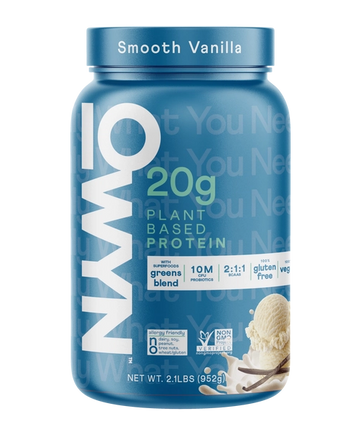Save 10% OFF All Subscription Orders.
Save 10% OFF All Subscription Orders.

Did you know that carbohydrates are one of the most important nutrients your body needs? Despite the often negative reputation, not all carbs are the same. Read below to understand the differences between the types of carbs.
What are Carbs and What are the Types of Carbs?
Carbohydrates, often referred to as carbs, are made up of glucose monomers. These glucose monomers, or sugar molecules, are combined to build larger carbohydrate macromolecules. Carbs are one of the three macronutrients, in addition to protein and fats, that are essential for proper bodily functions. According to the Dietary Guidelines of America, it is recommended that 45-65% of your calorie intake comes from carbohydrates based on a 2,000-calorie diet. In comparison to protein and fat, this has the highest percentage, which means it is crucial that the carbohydrates are coming from a nutrient-rich carbohydrate source. There are two main categories that are classified as:
- Simple. Simple carbohydrates, suggested in the name itself, are the simplest form of carbohydrates. Food sources of simple carbs include sugar found in refined and processed foods, such as candy, ice cream, cookies, sugar sweetened beverages, white bread, white rice, and pasta. These foods are also typically considered to be refined carbohydrates that have a high glycemic index and load, meaning they can negatively impact blood sugar levels. So, it is recommended that these foods are limited or eliminated from the diet, as excess consumption of added sugars can increase the risk of several chronic diseases. There are also natural sugars that are considered to also contain some simple carbs, such as certain types of fruits, vegetables, and dairy products. However, these food groups also contain other micronutrients and fiber that are beneficial; thus, are recommended to be consumed in a regular diet.
- Complex. Complex carbohydrates are composed of several simple sugars chemically bonded together, which include starches and dietary fiber. Starches are the main source of carbs that play an integral role in the diet, as they provide our bodies with energy needed to carry out daily tasks. Therefore, these foods should be included in the diet. Food sources of starches include rice, pasta, bread, and cereals. There are also starchy vegetables, such as corn, peas, and potatoes. In addition to starchy carbs, there is also dietary fiber, which is an important component often found in legumes, vegetables, fruits, whole grains, nuts, and seeds. Dietary fiber has been shown to improve digestion and reduce the risk of several chronic diseases. Plus, fiber can help with weight loss and maintenance, as it helps to keep you feeling full longer. In contrast to simple carbs, complex carbs are typically referred to as unrefined carbohydrates that have a low glycemic index and load, meaning they can help to maintain normal blood sugar levels.
What are Net Digestible Carbs?
Net digestible carbs are the amount of carbs that can be fully digested and absorbed after consumption. All carbs are digested differently in the body and undergo various processes. For instance, the carbs that are fully digested typically include the simple carbs while the carbs that are not fully digested include the complex carbs.
How Does the Body Process Fiber Carbs?
Fiber is one of the main types of carbs that is considered indigestible due to its components, specifically the bran—part of the whole grain that has the most amount of fiber. Simple carbs are easily broken down into their sugar molecules, specifically glucose. However, complex carbs, such as fiber, go through the intestinal tract and colon undigested and still intact. Fiber goes through a process of fermentation, which is beneficial to the gut microbiome because it produces metabolites that help to feed the good bacteria in the gut. Additionally, since fiber remains undigested, it helps to increase satiety levels, improve bowel function, and maintain proper digestion. The combination of these characteristics of fiber can help to maintain a healthy weight.
How Does the Body Process Sugar Alcohol Carbs?
Similar to fiber, sugar alcohol carbs are not fully digested. Some types of sugar alcohol carbs include xylitol, maltitol, erythritol, isomalt, and sorbitol. When found in a package, these foods are typically labeled “sugar-free” and can be found in chewing gum, candies, ice cream, chocolate, and baked goods. Although sugar alcohol carbs are low in calories and may contribute to benefits regarding weight maintenance and diabetes management, they may cause gastrointestinal issues, such as bloating, constipation, cramps, or diarrhea. They undergo a similar process as fiber—fermentation—in which the production of short chain fatty acids and gasses are produced. For this reason, excess intake of sugar alcohol carbs may result in the GI issues previously mentioned.
How to Calculate Net Carbs?
Since some carbs don’t get fully digested, such as fiber and some sugar alcohols, you can calculate the amount of net digestible carbs by subtracting grams of dietary fiber and half the grams of sugar alcohols from grams of total carbs. In turn, these indigestible carbs can decrease the overall net digestible carbs. To understand this calculation in more detail, let’s break it down together using some example calculations:
Equation: Total Carbs - Dietary Fiber = Net Carbs
- OWYN 20-gram Protein Shake:
10 grams Total Carbs –5 grams Dietary Fiber = 5 Net Carbs
- Pro Elite Protein Shake
7 grams Total Carbs –7 grams Dietary Fiber = 0 Net Carbs
As you can see OWYN’s products have a low net carb, if any at all. The net carbs were canceled primarily due to the fiber content found in our products. Fiber plays an integral role in overall metabolism and has several digestive benefits. OWYN’s products are an excellent option for those looking to increase their fiber intake and reduce their overall net carb intake.

What Are Macronutrients and Why Do They Matter?
Are you wondering what exactly are macronutrients? We break down the three essential nutrients.

Chocolate Dipped Strawberry Protein Shake
Craving something that tastes like dessert but still delivers on nutrition? The Chocolate Dipped Strawberry Protein Shake is rich, refreshing, and perfect as a post-workout boost, afternoon pick-me-up, or anytime you want a chocolatey, feel-good treat.



